Interview - Ouija Origin of Evil : Let's talk with The Newton Brothers
By Mulder, Los Angeles, 31 october 2016
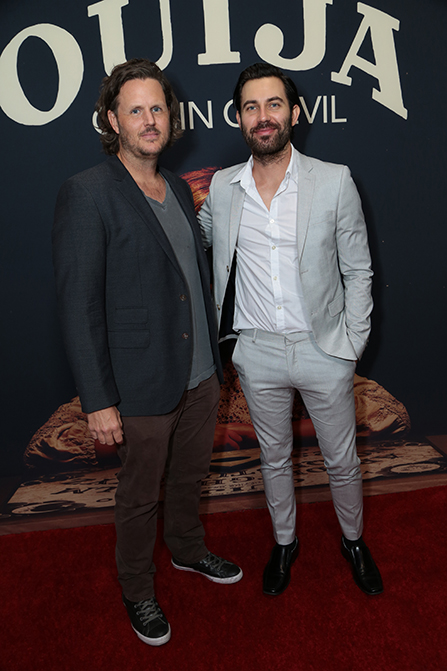
Andy and Taylor were both learning and making music from a young age, educated and inspired by such wide-ranging influences as Puccini operas, John Williams film scores, and albums by Kraftwerk and Nine Inch Nails. Between the two, they play piano, guitar, bass, clarinet, flute, accordion, sax, harmonica, percussion, organ, kazoo, and cello. They fuse their classical education with a skill and savvy in electronics and manipulated sounds,to contribute distinct music to a diverse spectrum of film projects and capitalize on having two musical heads. TNB added chills to Mike Flanagan’s Oculus, emotion to Tony Kaye’s acclaimed classroom drama Detachment, tension to Mike Gunther’s crime thriller Setup (starring Bruce Willis), and black humor to Pawn Shop Chronicles (starring Paul Walker). They recently lent their Newtonian approach to the dark comedy Life of Crime (starring Jennifer Aniston), the action/thriller The Prince (Starring Bruce Willis and John Cusack) and reteamed with Mike Flanagan for Somnia. (source: http://www.thenewtonbrothers.com)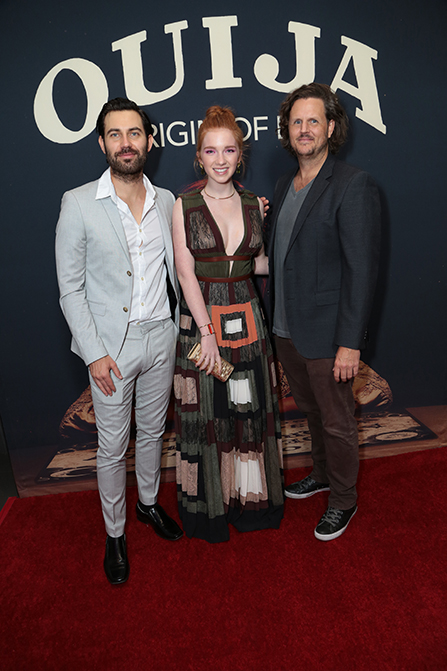
Q: Can you explain the origin of the name of your group The Newton Brothers?
The Newton Brothers : We needed a name to write under as a group. Randomly, we are both fans of Sir Isaac Newton and we wanted a name that would allow us to score Legends of the Fall 2 or Fight Club 2.
Q: What can you say about your collaboration with Hans Zimmer in the beginning of your career?
Andy Grush : Taylor spent quite a bit of time working with Hans and it was a fantastic experience. Hans is incredibly talented on so many levels, and being able to learn from him first-hand was an experience that really helped us in many ways.
Q: How did you work with the director Mike Flanagan in order to create the score of Ouija: Origin of Evil?
The Newton Brothers: All of our projects with Mike are very collaborative. He’s an amazing musician and on multiple occasions he’ll walk over to the baby grand in one of our playback studios and play a theme we’ve played for him and suggest a scoring point, chord change, melody or tempo idea. Alternatively, he’s also written themes and chord progressions he’ll play for us as ideas to work with, which is incredibly useful. For Ouija, a lot of the score was a process of toying with instrumentation and production to accommodate the score we wrote in a way that made the score feel like it was written and recorded in the 60’s.
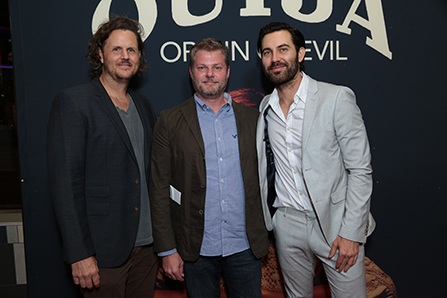
Q: This is your new collaboration with Taylor Stewart / Andy Grush. You have worked on Hush (2016), Before I Wake (2016) and Oculus (2013). How have you divided the score up with Taylor Stewart / Andy Grush in general?
The Newton Brothers: : Typically, we’ll both talk a lot about what the score and what the tone and emotional content are within the film. From there, we don’t talk to each other for about two weeks while we both write, record and produce ideas. At some point, we’ll come together and play things for each other, and discuss the good, the bad and the ugly, then revise and tweak a bit more before our first playback. We are incredibly particular about feedback, which we put into a Google doc, so we don’t have to be constantly calling and updating each other on progress, notes or ideas.
Q: What is for you a good horror movie, and what is your favorite and why?
Taylor Stewart : : Poltergeist because of its combination of horror, fantasy and storytelling mixed with an incredible score.
Andy: The Exorcist for me is the scariest film I have ever seen. The way that story is told in the film and the elements they use to tell that story are crippling for me. To this day, I have trouble sleeping for days each time I watch it.
Q: What can you say about your collaboration with Danny Elfman on Mike Flanagan’s thriller, Before I Wake?
The Newton Brothers : That was a wonderful experience. We’ve been really lucky to work for Hans, and to collaborate with Danny, and even John Debney. Working with Danny on Before I Wake was a lot of fun. Danny has a wonderful collection of instruments that gave us great inspiration for ideas even if we didn’t use certain instruments, the process of playing with some of those and having them at our disposal was very valuable. We are all very proud of that score and that film. It’s such a wonderful story.
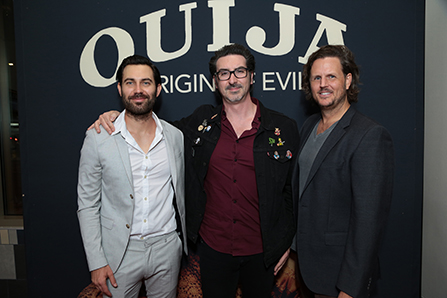
Q: For you, how important is the music in a horror movie to create an atmosphere?
The Newton Brothers : The music in a horror film is critical. It dances a very intimate dance with the story of the film, and if each are executed in harmony, it can provide such a terrifying experience, but it takes a lot of thought to have the story and score work together. Ouija was a great example of crafting moments of silence in just the right places, so that the moments of score are effective. It’s also critical to make sure you don’t just have a wall of noise or long drones running on from scene to scene. Those things can actually lull viewers a bit and that goes against the whole point of horror films. The trick is dancing that fine line with the story and score to accent and support in just the right places.
Q: What were the main difficulties that you have met during the creation of this score?
The Newton Brothers : The biggest trick in regards to the Ouija score was finding the right amount of “60’s” sound without sounding too dated. We went through a lot of ideas in themes and sounds to find a sound that we were all loving. The waterphone played a big part in creating warped textures to warble and invade the senses on top of the strings, winds and piano.
Q: The score of Ouija: Origin of Evil was recorded in the heart of Nashville’s Music Row at Ocean Way Studio in a restored church with an 80 piece orchestra. How have you chosen the instruments to use for this film?
Andy Grush : Taylor had this fantastic idea to use the waterphone in the score. From there, we knew that the room we recorded in, and the players we recorded with were going to be a very important part of the process. While we were working on the score, John Debney had invited us to sit in on a recording session with the same Nashville band for one of his films, and we decided that we really wanted to lean on them to help us relay that atmosphere that our orchestrator Jason Turbin spent a lot of time fine-tuning to play delicately along each scene.
Q: How did you create the main theme of this film?
The Newton Brothers : The main theme needed to be something delicate that could also swell, and a really important part of that was having the loss of the family’s husband and father play into the main theme, as they go through a tough time getting over his death. The theme also needed to carry the audience and needed to be able to take sharp turns in various scenes, going from a feeling of calm and peace to a feeling of utter chaos and fright. Mike played us his idea of the main theme at some point and that ended up being a significant part of our main theme, which is wonderful and speaks to his creative vision.
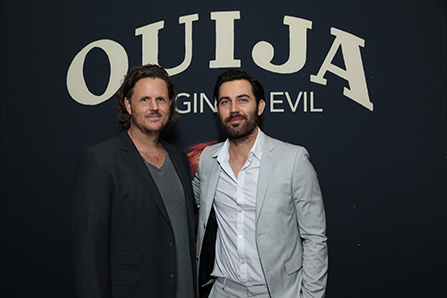
Q: What do you like about the process of film scoring?
The Newton Brothers : We love how the process evolves into partnering to tell the story. Writing, recording and producing the score is always a challenge, and offers discovery into how far we can push the writing and production to make it something unique and interesting. There are scores which evoke a sound that makes you feel like you know what that sound is right away. Max Steiner’s The Treasure of the Sierra Madre is one of those scores, which dictated how “Westerns” sounded for so many years following it. Staying unique can be a real challenge, and we’re not always ending up in a unique creative zone, but pushing ourselves to try our best to be unique to each film is probably what we love the most about the scoring process.
Q: Which American directors would you like to work with?
The Newton Brothers : Robert Towne, David Fincher, James Cameron, Cameron Crowe, Steven Spielberg, Terrance Malick and Edward Zwick.
Q: Which composers are for you a source of inspiration?
The Newton Brothers : Bernard Herrmann, John Barry, Jerry Goldsmith, James Horner, Thomas Newman and John Debney.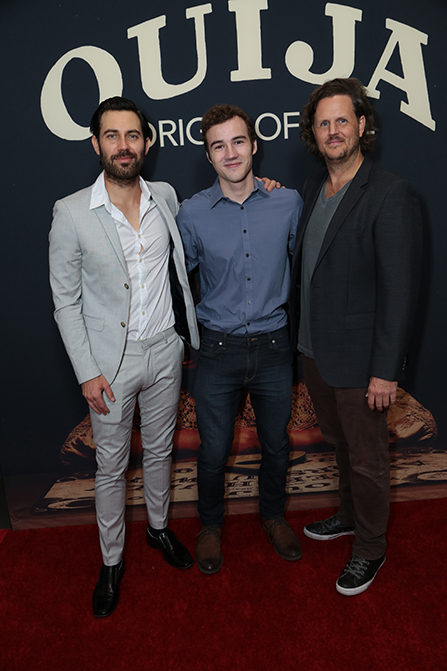
Q: What are your current project (s)?
The Newton Brothers : We are currently working on themes for the upcoming Stephen King film Gerald’s Game.
Q: What kind of advice could you give to someone who would like to work as a musical composer?
The Newton Brothers : Best advice for this is to just start writing for film and establishing relationships with directors, producers and editors. They are the people who will be hiring you and thinking of your craft when they start their second, third and tenth projects. It’s important to have those relationships as you begin your career. We started working with director/writer Zack Parker back in 2002 and have worked with him ever since. Work on as many things as you can.
We sincerely thank The Newton Brothers interview (Taylor Stewart_Andy Grush) for answering our questions
An huge thanks to Ali Homek for helping us to have this interview..
Credit photos : Berliner Images - Universal Pictures

